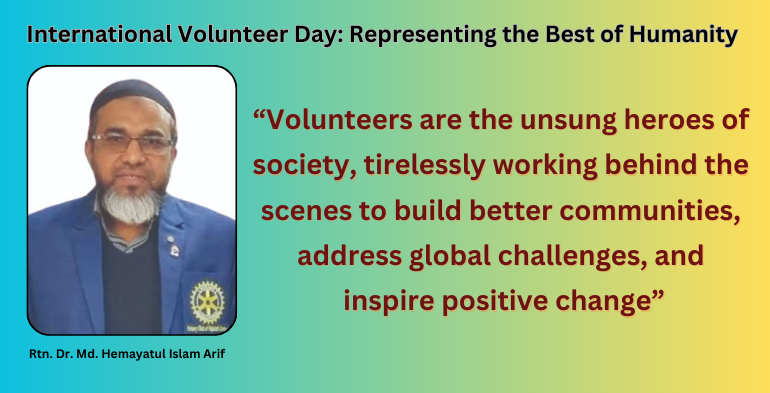
Rtn. Dr. Md. Hemayatul Islam Arif: Volunteers are the unsung heroes of society, tirelessly working behind the scenes to build better communities, address global challenges, and inspire positive change. International Volunteer Day (IVD), celebrated annually on (December 5th) , honors the countless individuals and organizations committed to volunteerism. Since its establishment by the United Nations General Assembly in 1985, IVD has been a day to reflect on the immense contributions of volunteers, mobilize support for their efforts, and promote volunteerism as a powerful tool for achieving sustainable development. The 2024 theme, "Representing the Best of Humanity," encapsulates the essence of volunteerism and the altruistic spirit that drives it.
The Origin and Purpose of International Volunteer Day
IVD was established to recognize the role of volunteers in fostering economic and social development worldwide. Mandated by the UN General Assembly, this observance aims to:
- Promote Volunteerism: Highlight the importance of volunteering as a means of addressing social issues and creating equitable societies.
- Encourage Governmental Support: Advocate for policies and frameworks that enable and empower volunteers.
- Recognize Contributions: Celebrate the invaluable efforts of individuals and organizations in advancing global peace, justice, and development.
- The United Nations Volunteers (UNV) program plays a pivotal role in coordinating IVD activities globally. By integrating volunteerism into development programming and raising awareness about its impact, the UNV program ensures that the spirit of volunteerism reaches every corner of the world.
Volunteerism and the Sustainable Development Goals (SDGs)
Volunteerism is closely intertwined with the United Nations' 2030 Agenda for Sustainable Development. Volunteers act as agents of change, contributing to the realization of all 17 SDGs by:
- Promoting Inclusivity: Volunteers work to ensure no one is left behind, especially marginalized groups such as women, children, the elderly, and persons with disabilities.
- Driving Climate Action: Many volunteers are at the forefront of environmental campaigns, raising awareness about climate change and implementing grassroots solutions.
- Advancing Education and Health: From teaching underprivileged children to delivering essential healthcare services, volunteers play a critical role in strengthening social systems.
- Through these efforts, volunteers not only address immediate challenges but also foster long-term resilience and self-reliance within communities.
The 2024 Theme: Representing the Best of Humanity
The theme for IVD 2024, "Representing the Best of Humanity," underscores the intrinsic values of empathy, generosity, and solidarity that define volunteerism. It serves as a reminder that every act of volunteering—whether big or small—reflects the highest ideals of human kindness and compassion.
Empathy in Action
Volunteers bridge gaps in society, reaching out to those who are often overlooked. Whether providing disaster relief, mentoring youth, or advocating for human rights, their actions embody a profound sense of empathy and understanding.
Generosity Beyond Borders
Volunteerism transcends national boundaries, cultural differences, and economic divides. From local grassroots initiatives to international missions, volunteers showcase a willingness to share time, skills, and resources to improve the lives of others.
Solidarity in Diversity
The global volunteer movement is a testament to the strength of unity in diversity. Volunteers come from all walks of life, yet they are united by a shared commitment to making the world a better place.
Stories of Volunteer Impact: Exemplifying the Best of Humanity
Case Study 1: Environmental Conservation in the Amazon
A group of young volunteers from Brazil launched a project to combat deforestation in the Amazon. Their efforts included planting thousands of native trees, educating local communities about sustainable farming practices, and advocating for stricter environmental policies. Their work not only restored degraded land but also inspired similar initiatives across Latin America.
Case Study 2: Empowering Women in Rural Africa
In Kenya, a volunteer-driven organization introduced microfinance programs for women in rural areas. By providing access to small loans and entrepreneurship training, the initiative empowered women to start businesses, improve household incomes, and uplift their communities.
Case Study 3: Disaster Response in South Asia
After a devastating flood in Bangladesh, volunteers played a crucial role in rescue operations, distributing relief supplies, and rebuilding homes. Their swift and selfless response saved countless lives and demonstrated the vital role of volunteers in disaster management.
Challenges Faced by Volunteers
While volunteerism is inherently rewarding, it is not without challenges. Volunteers often face:
Resource Constraints: Limited funding and access to necessary tools can hinder the effectiveness of volunteer initiatives.
Emotional Strain: Dealing with traumatic situations, such as humanitarian crises, can take a toll on volunteers' mental health.
Lack of Recognition: Many volunteers work tirelessly without adequate acknowledgment of their contributions.
Addressing these challenges requires collaborative efforts from governments, NGOs, and the private sector to provide better support systems for volunteers.
The Role of Governments and Organizations in Supporting Volunteerism
Governments, NGOs, and private entities have a significant role in fostering a culture of volunteerism. By creating enabling environments and recognizing volunteer contributions, they can amplify the impact of volunteer efforts. Key strategies include:
- Policy Development: Establishing national frameworks that encourage and regulate volunteerism.
- Capacity Building: Providing training, resources, and infrastructure to enhance the effectiveness of volunteer programs.
- Recognition and Incentives: Celebrating volunteer achievements through awards, certifications, and public acknowledgment.
The Future of Volunteerism
As the world becomes increasingly interconnected, the scope and impact of volunteerism are set to grow. Emerging trends include:
Digital Volunteerism: Leveraging technology to engage volunteers remotely and expand the reach of initiatives.
Corporate Social Responsibility (CSR): Encouraging businesses to integrate volunteer programs into their CSR strategies.
Youth Engagement: Inspiring the next generation to embrace volunteerism as a pathway to personal and professional growth.
How to Get Involved in International Volunteer Day
Anyone can participate in IVD and contribute to the global volunteer movement. Here are some ways to get involved:
Volunteer Locally: Join a community organization or start a small initiative to address local challenges.
Advocate for Volunteerism: Use social media platforms to raise awareness about the importance of volunteering.
Support Volunteer Organizations: Donate resources or offer professional expertise to volunteer-driven projects.
Conclusion
International Volunteer Day serves as a powerful reminder of the transformative potential of volunteerism. By recognizing and celebrating the efforts of volunteers, we honor the spirit of humanity and inspire others to join the movement. As we mark IVD 2024 under the theme "Representing the Best of Humanity," let us reaffirm our commitment to volunteerism and work together to build a more inclusive, sustainable, and compassionate world.
Through their dedication, resilience, and selflessness, volunteers truly represent the best of humanity, proving that collective action can lead to meaningful change.
Writer: Deputy Chief Veterinarian, Department of Veterinary & Animal Sciences, University of Rajshahi, Bangladesh
&
President (2023-24), Rotary Club of Rajshahi Central; General Secretary, Bangladesh Livestock Society (BLS)
























